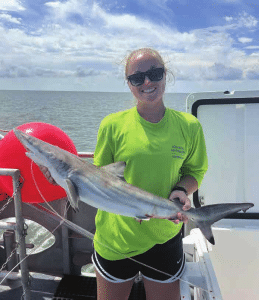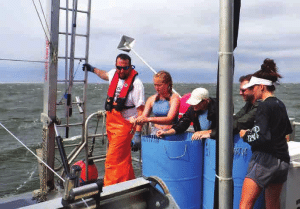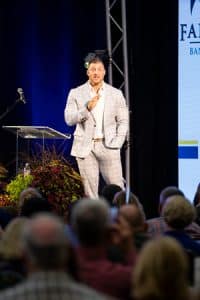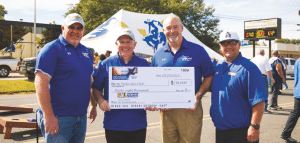 Near the sandy beaches of Ocean Springs, a cozy town of less than 18,000 residents, sits The University of Southern Mississippi’s Gulf Coast Research Laboratory. Established in 1947, the GCRL is home to the Summer Field Program.
Near the sandy beaches of Ocean Springs, a cozy town of less than 18,000 residents, sits The University of Southern Mississippi’s Gulf Coast Research Laboratory. Established in 1947, the GCRL is home to the Summer Field Program.
In June 2022, eight Southern Arkansas University, Magnolia, students traveled to Ocean Springs to take classes while working alongside researchers. Two of those students were Whitney Brown, a senior from Bryant, Arkansas, and Landrey Pruitt, a senior from Cabot, Arkansas.
“We were doing the fisheries’ projects—actual studies that were going to NOAA (National Oceanic and Atmospheric Administration). It was hands on. We were working with sharks,” Whitney said, “and who gets to work with sharks?!”
USM is an affiliate partnership in which SAU students receive in-state tuition rates and credits for coursework that transfer seamlessly. The Summer Field Program affords marine biology majors like Landrey and Whitney hands-on training, extending what they’re learning in Arkansas’ freshwater sites to the coast while not veering too far from home.
“We’re still close enough, at a six-and-a-half-hour drive, to the Gulf that there is this corridor and this established partnership. It’s at a comfortable distance to still have access to the field experience,” said Dr. Jesse Filbrun, associate professor of biology and marine biology advisor.
Dr. Filbrun has been teaching at the GCRL since 2019. After completing his postdoctoral research in Southern Mississippi, Dr. Filbrun is familiar with the institution and its staff.
“Independent of talking to me, GCRL faculty were impressed enough with our students that they invited them to do independent research in July. It’s not every student that gets to do that. We had a great group this summer, and they reflected well on SAU and me as their advisor. It’s exciting to see that,” Filbrun said.
 Whitney Brown’s internship consisted of gill netting and longlining for both the shark and fish sides of the fishery. While she cooed over baby sharks and stingrays, Whitney also understood the gravity of GCRL’s mission.
Whitney Brown’s internship consisted of gill netting and longlining for both the shark and fish sides of the fishery. While she cooed over baby sharks and stingrays, Whitney also understood the gravity of GCRL’s mission.
“Sharks are overfished on the coast. So, the fishery is making sure the populations aren’t bottoming out, and the same with the fish.”
Landrey Pruitt spent much of her internship in the lab, sorting through driftnet samples. One of her fondest memories, though, was helping a researcher who was tracking sturgeon migration patterns. She collected sturgeon, cleaned the receivers and recorded data.
“When we were on the boat, I felt like a pirate,” Landrey said. “It was so much fun.”
An important benefit of the Summer Field Program experience is the number of professional networks SAU students form. For example, Landrey was invited to present research with her colleagues at a convention in 2023.
Both Landrey and Whitney highly recommend the GCRL Summer Field Program to their peers; however, some students miss this opportunity as climbing room and board costs are a barrier. Please contact the Division of Advancement at (870) 235-4078 or visit www.saufoundation.org/make-a-gift.




